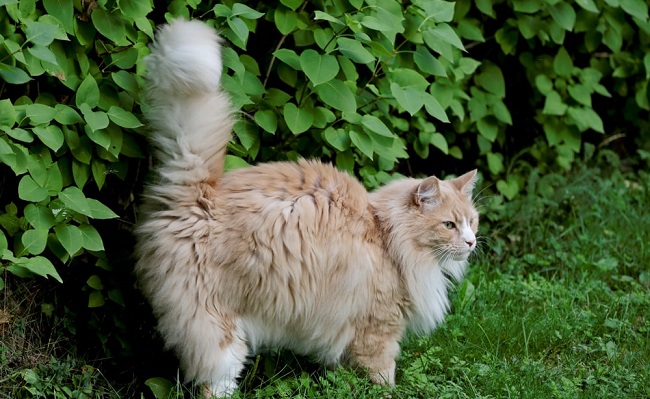Welcome, cat lovers! Today’s focus keyword is “When Do Male Cats Start Spraying?”. We will take a deep dive into the world of feline behavior, exploring the unique marking behavior that puzzles and sometimes frustrates many cat owners.
This guide will provide insights on when male cats typically start spraying, why this behavior occurs, and what you can do to manage it.

The ‘Spray’ Phase in Male Cats
Male cats typically start spraying as they reach sexual maturity, which is generally between six months and one year of age. Spraying, or urine marking, is a natural behavior observed in intact (not neutered) male cats, and it’s primarily used to mark their territory and communicate with other cats. While it’s often associated with claiming territory, it can also indicate stress or anxiety.
Why Male Cats Spray?
Male cats spray as a form of olfactory communication. The strong smell of a cat’s spray is a clear message to other cats about his presence, territory, and mating availability. It’s also a way for male cats to assert dominance, particularly in multi-cat households or areas with numerous feral cats.
Spraying and Neutering
Many cat owners wonder if neutering can prevent or stop spraying behavior. The answer is yes, neutering can significantly reduce or eliminate spraying in male cats.
However, if a cat has been spraying before being neutered, the behavior may continue out of habit. It’s generally recommended to neuter cats before they reach sexual maturity to prevent the onset of spraying.
How to Manage Spraying
If your cat starts spraying, there are several ways you can manage the behavior:
Neuter Early: As mentioned above, neutering your male cat before it reaches sexual maturity can help prevent the onset of spraying.
Reduce Stress: Changes in the environment, such as moving homes, introducing a new pet, or even changing your work hours, can stress your cat and trigger spraying. Maintain a stable environment for your cat and introduce changes gradually.
Provide Enough Resources: In multi-cat households, provide enough litter boxes, feeding bowls, and resting areas to avoid competition and territorial disputes.
Use Pheromone Diffusers: These devices mimic the “friendly” markers in a cat’s facial pheromones, helping to create a sense of security and reducing the need for territorial marking.
Spraying vs. Urination: Understanding the Difference
An essential aspect of understanding and managing cat spraying behavior is to differentiate between spraying and inappropriate urination. Both behaviors involve the cat eliminating outside the litter box, but they have different causes and solutions.
Spraying: When a cat is spraying, he will back up to a vertical surface with his tail erect and often quivering. He’ll then release a squirt of urine, leaving a distinctive scent mark. This behavior is generally related to marking territory or communication with other cats.
Urination: In contrast, when a cat urinates, he usually squats to eliminate a larger volume of urine on a horizontal surface. This behavior might be linked to medical issues, dissatisfaction with the litter box, or stress.
By understanding the difference between these two behaviors, you can effectively identify the problem and seek appropriate solutions.
Dealing with Spraying: Consult a Veterinarian
If your male cat starts spraying, the first step is always to consult a veterinarian. Although spraying is a normal behavior in mature male cats, it can sometimes indicate an underlying health problem, such as a urinary tract infection or bladder stones.
Once medical conditions have been ruled out, your veterinarian can provide advice on behavioral modifications or recommend a pet behaviorist to address the issue. It’s also worth discussing the option of neutering if your cat is still intact. Neutering significantly reduces the likelihood of spraying behavior, especially when done at a young age.
How to Clean Cat Spray
The smell of cat spray can be overpowering and unpleasant. It’s important to clean sprayed areas thoroughly to discourage the cat from re-marking.
Enzymatic cleaners are usually the best option, as they break down the chemicals in cat urine, effectively removing the scent. Avoid using ammonia-based cleaners, as they can mimic the smell of cat urine and may encourage more spraying.
Conclusion
Spraying is a natural behavior in male cats, typically starting when they reach sexual maturity. However, this behavior can be managed with early neutering, reducing stress, providing adequate resources, and using pheromone diffusers.
Always remember, while it might be frustrating, your feline friend isn’t doing this to annoy you. They’re simply following their natural instincts.
























